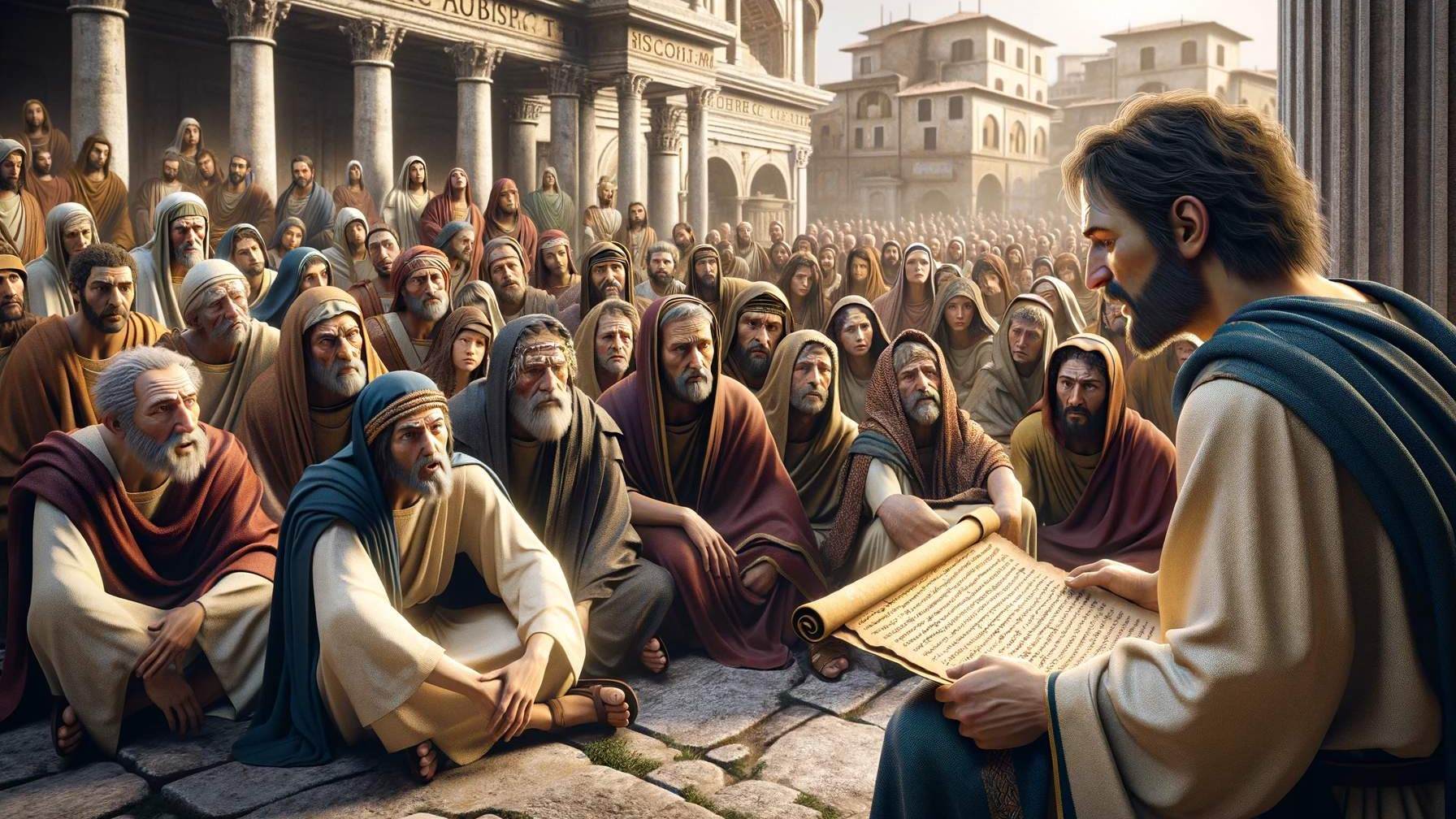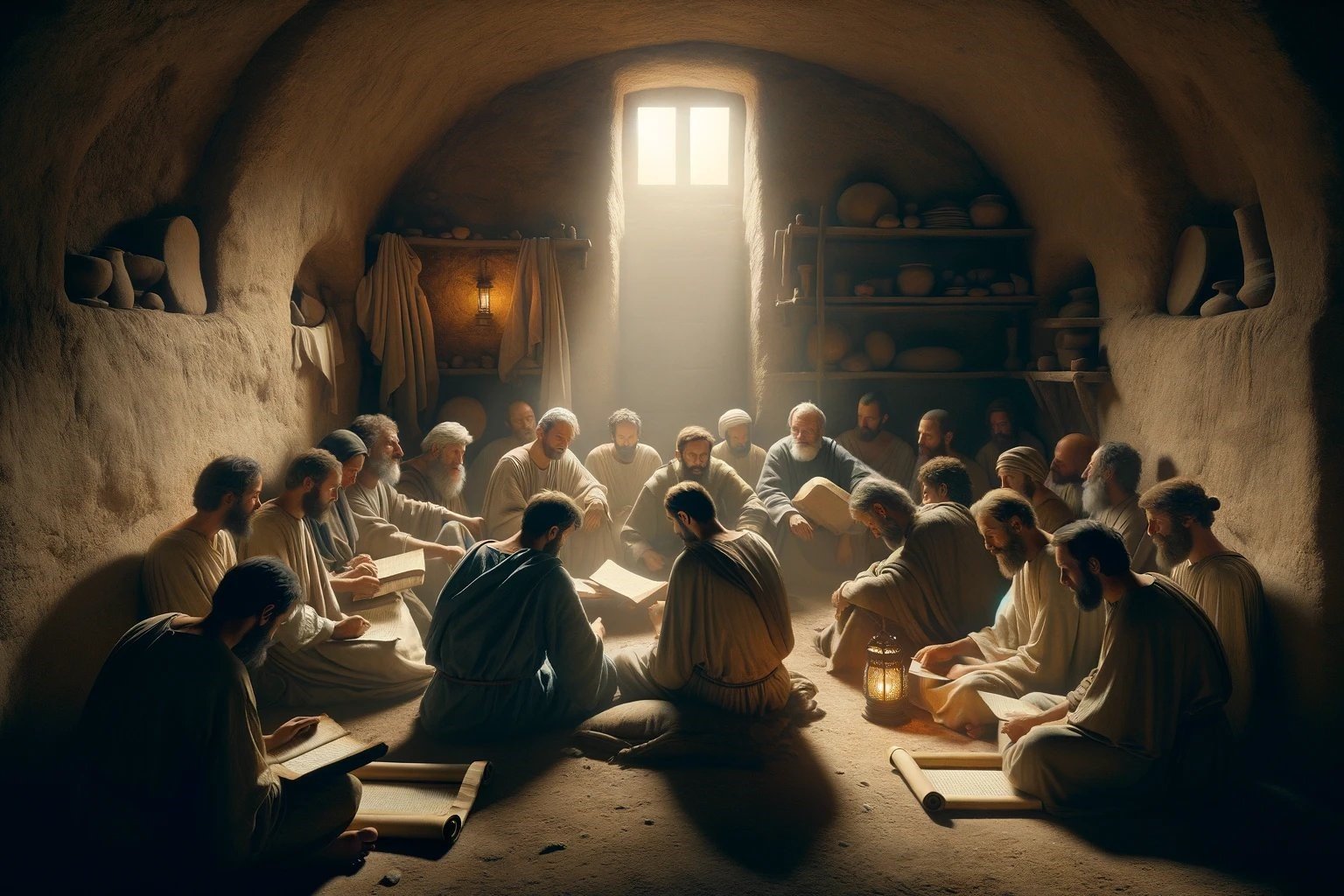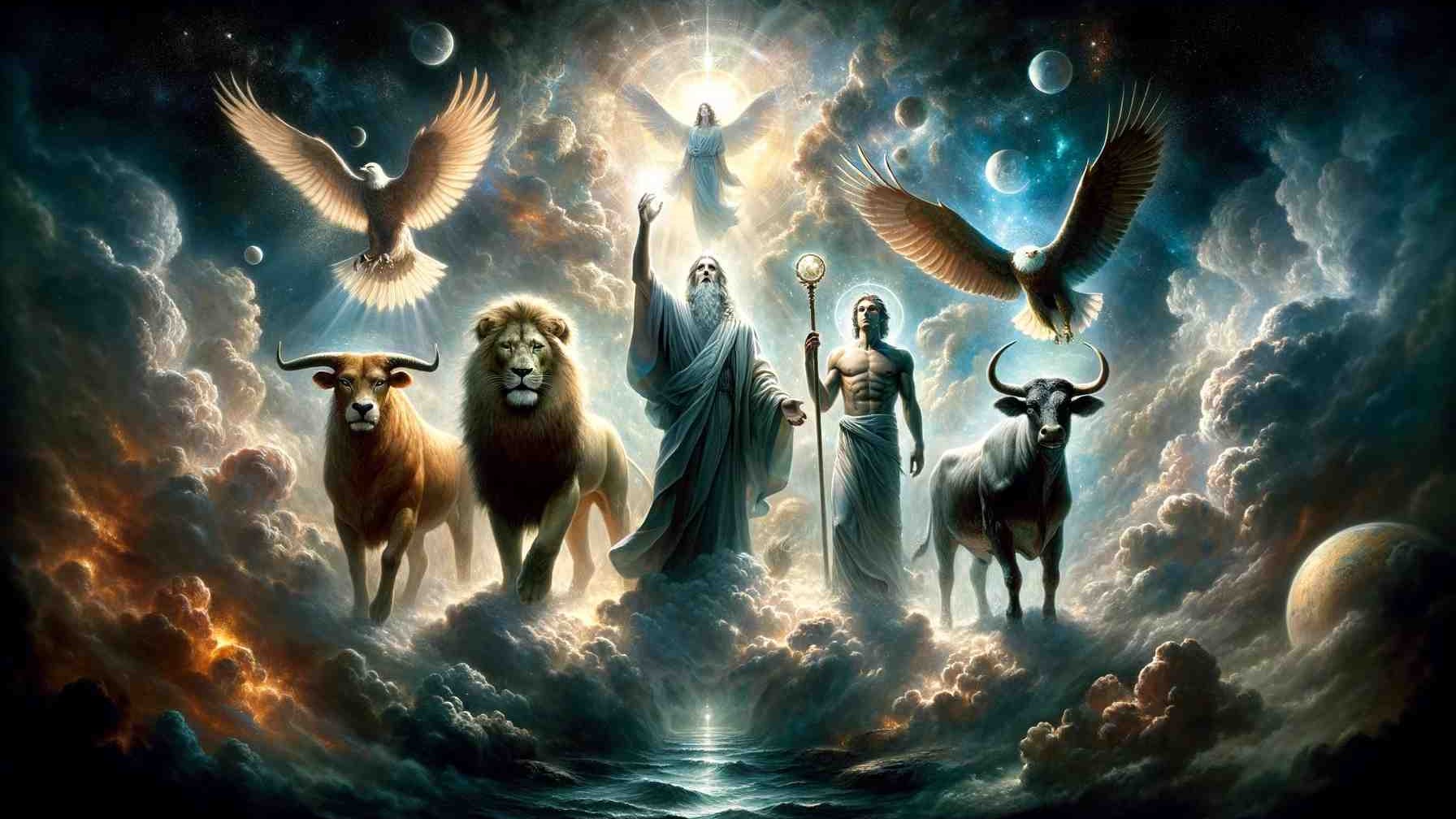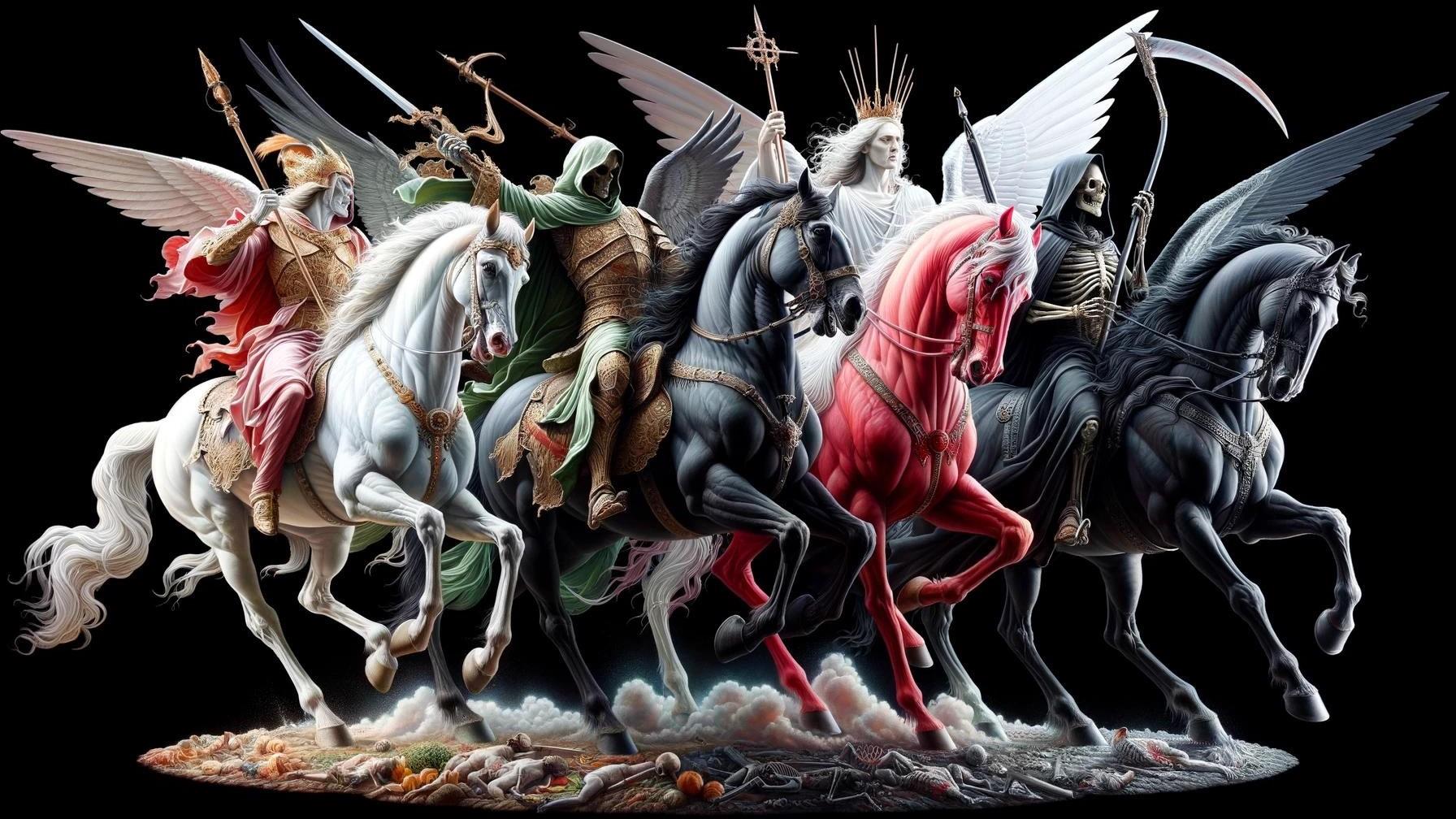Home>Bible Facts>What Are The 7 Mountains In The Book Of Revelation 17


Bible Facts
What Are The 7 Mountains In The Book Of Revelation 17
Published: February 11, 2024
Jason DeRose, Managing Editor at Christian.net, uses his expertise in religion and journalism to deepen understanding of faith's societal impacts. His editorial leadership, coupled with a strong academic background, enriches the platform’s diverse content, earning him recognition in both journalism and religious circles.
Discover the significance of the 7 mountains mentioned in the Book of Revelation 17. Explore fascinating Bible facts and interpretations. Unlock the mysteries of Revelation!
(Many of the links in this article redirect to a specific reviewed product. Your purchase of these products through affiliate links helps to generate commission for Christian.net, at no extra cost. Learn more)
Table of Contents
Introduction
The Book of Revelation, the final book of the New Testament, is a profound and enigmatic text that has captivated readers for centuries. Within its pages, the author, traditionally believed to be the apostle John, unveils a series of vivid and symbolic visions that offer a glimpse into the cosmic battle between good and evil, the ultimate triumph of righteousness, and the establishment of God's eternal kingdom.
Central to the imagery presented in the Book of Revelation are the "seven mountains" or "seven hills," which hold significant symbolic meaning. These mountains are intricately linked to the portrayal of a great city, often referred to as Babylon, and are emblematic of various powers and spiritual forces at work in the world.
As we delve into the exploration of the seven mountains in the Book of Revelation, it is essential to approach the subject with a sense of reverence and curiosity. The symbolism and allegorical nature of the text invite us to embark on a journey of interpretation, seeking to unravel the layers of meaning embedded within these ancient visions.
Throughout this exploration, we will encounter rich historical and theological insights that shed light on the spiritual significance of each mountain. By delving into the context of the ancient world and drawing parallels to the present day, we can glean valuable lessons and timeless truths that resonate with believers across generations.
Join me as we embark on a captivating journey through the seven mountains of Revelation, unraveling their profound symbolism and uncovering the enduring relevance of these ancient visions in our contemporary world. Let us venture forth with open hearts and inquisitive minds, ready to uncover the mysteries concealed within the sacred text.
Read more: What Is Babylon In The Book Of Revelation
The Mountain of Babylon
In the Book of Revelation, the mention of the "seven mountains" is intricately tied to the enigmatic depiction of Babylon, a symbol of spiritual corruption and worldly power. The first mountain represents the pervasive influence of Babylon, embodying the forces of opposition to God's kingdom. This imagery harks back to the historical significance of Babylon as a formidable empire that opposed God's people and sought to exalt itself above all other powers.
Babylon, with its opulence and allure, serves as a compelling metaphor for the seductive nature of worldly systems that stand in opposition to the divine order. The mountain of Babylon symbolizes the pervasive influence of secular ideologies, materialism, and the pursuit of power at the expense of spiritual values. It embodies the spirit of rebellion and self-exaltation, drawing parallels to the ancient city's defiance of God's authority.
As we contemplate the significance of the mountain of Babylon, we are confronted with timeless truths that resonate with the human experience across cultures and epochs. The allure of worldly power and the temptation to prioritize material gain over spiritual fulfillment continue to exert their influence in contemporary society, mirroring the age-old struggles depicted in the Book of Revelation.
The imagery of Babylon's mountain serves as a poignant reminder of the enduring spiritual battle between the forces of light and darkness, virtue and vice. It prompts introspection and calls for discernment in navigating the complexities of a world marked by competing value systems and conflicting allegiances.
In essence, the mountain of Babylon beckons us to consider the pervasive influence of secular ideologies and the allure of worldly power, urging us to remain steadfast in our commitment to spiritual truths and unwavering in our allegiance to the divine order.
As we move forward in our exploration of the seven mountains in the Book of Revelation, let us carry with us the profound insights gleaned from the symbolism of Babylon's mountain, remaining attuned to the enduring relevance of its message in our contemporary lives.
The Mountain of Rome
In the Book of Revelation, the symbolism of the seven mountains is intricately intertwined with the enigmatic portrayal of Rome, a city synonymous with imperial power, cultural influence, and religious authority. The second mountain represents the formidable presence of Rome, embodying the complexities of political dominion, ideological influence, and spiritual compromise.
Rome, as the epicenter of the Roman Empire, held unparalleled sway over the ancient world, exerting its dominance through military conquests, administrative prowess, and the assimilation of diverse cultures. The mountain of Rome symbolizes the far-reaching impact of political and cultural hegemony, reflecting the intricate interplay between temporal authority and spiritual fidelity.
The imagery of Rome's mountain beckons us to contemplate the complexities of navigating the tension between civic responsibilities and unwavering devotion to spiritual truths. It serves as a poignant reminder of the perennial struggle to uphold moral integrity in the midst of societal pressures and political exigencies.
As we delve into the significance of the mountain of Rome, we are confronted with timeless truths that resonate with the human experience across epochs. The allure of temporal power and the complexities of navigating political landscapes continue to echo through the annals of history, mirroring the age-old tensions depicted in the Book of Revelation.
The symbolism of Rome's mountain prompts introspection and calls for discernment in navigating the complexities of a world marked by competing allegiances and moral ambiguities. It invites us to reflect on the delicate balance between civic engagement and unwavering commitment to spiritual principles, urging us to remain steadfast in upholding righteousness amidst the allure of temporal authority.
In essence, the mountain of Rome beckons us to consider the intricate interplay between political dominion and spiritual fidelity, urging us to remain resolute in our allegiance to enduring truths while navigating the complexities of societal structures. As we continue our exploration of the seven mountains in the Book of Revelation, let us carry with us the profound insights gleaned from the symbolism of Rome's mountain, remaining attuned to the enduring relevance of its message in our contemporary lives.
The Mountain of Pergamum
In the Book of Revelation, the mention of the "seven mountains" is intricately tied to the enigmatic depiction of Pergamum, a city renowned for its cultural significance, religious pluralism, and imperial grandeur. The third mountain represents the complex interplay of spiritual devotion and societal accommodation, embodying the challenges of maintaining unwavering faith amidst cultural diversity and ideological tensions.
Pergamum, as a center of learning and religious syncretism, stood as a testament to the convergence of diverse belief systems and cultural influences. The mountain of Pergamum symbolizes the intricate dynamics of religious pluralism and the subtle allure of compromise, reflecting the perennial struggle to uphold spiritual purity in the midst of cultural assimilation and ideological diversity.
The imagery of Pergamum's mountain prompts introspection and calls for discernment in navigating the complexities of a society marked by religious pluralism and ideological diversity. It invites us to reflect on the delicate balance between cultural engagement and unwavering commitment to spiritual truths, urging us to remain steadfast in upholding the purity of faith amidst the allure of syncretic beliefs.
As we delve into the significance of the mountain of Pergamum, we are confronted with timeless truths that resonate with the human experience across epochs. The challenges of navigating religious pluralism and cultural diversity continue to echo through the annals of history, mirroring the age-old tensions depicted in the Book of Revelation.
The symbolism of Pergamum's mountain serves as a poignant reminder of the enduring spiritual battle to maintain fidelity to divine truths amidst the complexities of a diverse and pluralistic society. It beckons us to consider the intricate interplay between cultural assimilation and spiritual purity, urging us to remain resolute in our allegiance to unwavering faith while embracing the diversity of human experience.
As we continue our exploration of the seven mountains in the Book of Revelation, let us carry with us the profound insights gleaned from the symbolism of Pergamum's mountain, remaining attuned to the enduring relevance of its message in our contemporary lives.
The Mountain of Thyatira
In the Book of Revelation, the symbolism of the seven mountains is intricately intertwined with the enigmatic portrayal of Thyatira, a city renowned for its trade guilds, commercial prowess, and artisanal heritage. The fourth mountain represents the intricate interplay of economic prosperity and moral compromise, embodying the challenges of upholding ethical integrity amidst the allure of material gain and societal expectations.
Thyatira, as a hub of commercial activity and artisanal craftsmanship, stood as a testament to the economic vibrancy and entrepreneurial spirit of the ancient world. The mountain of Thyatira symbolizes the complexities of navigating the pursuit of prosperity while maintaining unwavering ethical standards, reflecting the perennial struggle to uphold moral rectitude in the midst of economic pressures and societal norms.
The imagery of Thyatira's mountain prompts introspection and calls for discernment in navigating the complexities of a society marked by commercial enterprise and societal expectations. It invites us to reflect on the delicate balance between economic engagement and unwavering commitment to ethical principles, urging us to remain steadfast in upholding righteousness amidst the allure of material prosperity.
As we delve into the significance of the mountain of Thyatira, we are confronted with timeless truths that resonate with the human experience across epochs. The challenges of navigating economic prosperity and ethical integrity continue to echo through the annals of history, mirroring the age-old tensions depicted in the Book of Revelation.
The symbolism of Thyatira's mountain serves as a poignant reminder of the enduring spiritual battle to maintain fidelity to ethical principles amidst the complexities of a commercial and materialistic society. It beckons us to consider the intricate interplay between economic prosperity and moral rectitude, urging us to remain resolute in our commitment to unwavering ethical standards while embracing the opportunities and challenges of economic enterprise.
As we continue our exploration of the seven mountains in the Book of Revelation, let us carry with us the profound insights gleaned from the symbolism of Thyatira's mountain, remaining attuned to the enduring relevance of its message in our contemporary lives.
Read more: What Is The Little Book Of Revelation 10
The Mountain of Sardis
In the Book of Revelation, the symbolism of the seven mountains is intricately intertwined with the enigmatic portrayal of Sardis, a city renowned for its historical significance, cultural heritage, and architectural splendor. The fifth mountain represents the complexities of spiritual complacency and the call to awaken from spiritual lethargy, embodying the challenges of revitalizing faith amidst a backdrop of past glory and present stagnation.
Sardis, as a city with a storied past and a reputation for opulence, stood as a testament to the grandeur of ancient civilizations and the ebb and flow of human achievement. The mountain of Sardis symbolizes the subtle allure of resting on past accomplishments and the imperative to breathe new life into dormant faith, reflecting the perennial struggle to transcend the trappings of spiritual inertia and embrace a revitalized commitment to divine truths.
The imagery of Sardis' mountain prompts introspection and calls for discernment in navigating the complexities of spiritual complacency and the yearning for renewed fervor. It invites us to reflect on the delicate balance between historical legacy and the imperative of spiritual renewal, urging us to awaken from the slumber of apathy and embrace a vibrant, transformative faith.
As we delve into the significance of the mountain of Sardis, we are confronted with timeless truths that resonate with the human experience across epochs. The challenges of overcoming spiritual stagnation and revitalizing faith continue to echo through the annals of history, mirroring the age-old tensions depicted in the Book of Revelation.
The symbolism of Sardis' mountain serves as a poignant reminder of the enduring spiritual battle to transcend the inertia of past achievements and embrace a revitalized, dynamic faith. It beckons us to consider the intricate interplay between historical legacy and spiritual rejuvenation, urging us to remain resolute in our commitment to awakening from spiritual lethargy while honoring the richness of our spiritual heritage.
As we continue our exploration of the seven mountains in the Book of Revelation, let us carry with us the profound insights gleaned from the symbolism of Sardis' mountain, remaining attuned to the enduring relevance of its message in our contemporary lives.
The Mountain of Philadelphia
In the Book of Revelation, the symbolism of the seven mountains is intricately intertwined with the enigmatic portrayal of Philadelphia, a city renowned for its resilience, cultural diversity, and historical significance. The sixth mountain represents the enduring faithfulness and the promise of divine vindication, embodying the triumph of steadfast devotion amidst adversity and the assurance of an unshakable foundation.
Philadelphia, known as the "City of Brotherly Love," stood as a testament to the enduring spirit of community and the unwavering commitment to mutual support and solidarity. The mountain of Philadelphia symbolizes the triumph of perseverance and the assurance of divine favor, reflecting the timeless truth that unwavering faith is met with the promise of enduring reward.
The imagery of Philadelphia's mountain prompts introspection and calls for steadfastness in the face of adversity. It invites us to reflect on the transformative power of resilience and the enduring promise of divine vindication, urging us to remain steadfast in our devotion to enduring truths amidst the trials and tribulations of life.
As we delve into the significance of the mountain of Philadelphia, we are confronted with timeless truths that resonate with the human experience across epochs. The triumph of unwavering faith and the assurance of divine favor continue to echo through the annals of history, mirroring the age-old struggles depicted in the Book of Revelation.
The symbolism of Philadelphia's mountain serves as a poignant reminder of the enduring spiritual battle to persevere in the face of adversity and the promise of divine vindication. It beckons us to consider the transformative power of unwavering faith and the enduring assurance of divine favor, urging us to remain resolute in our commitment to enduring truths while embracing the promise of divine vindication.
As we continue our exploration of the seven mountains in the Book of Revelation, let us carry with us the profound insights gleaned from the symbolism of Philadelphia's mountain, remaining attuned to the enduring relevance of its message in our contemporary lives.
The Mountain of Laodicea
In the Book of Revelation, the symbolism of the seven mountains culminates in the enigmatic portrayal of Laodicea, a city renowned for its wealth, commercial prosperity, and lukewarm spiritual condition. The seventh mountain represents the peril of spiritual apathy and the urgent call to embrace wholehearted devotion, embodying the stark contrast between material abundance and spiritual destitution.
Laodicea, as a center of commerce and opulence, stood as a testament to the allure of material wealth and the subtle erosion of spiritual fervor. The mountain of Laodicea symbolizes the perilous state of spiritual complacency and the imperative of wholehearted devotion, reflecting the timeless truth that lukewarm faith is met with divine admonition and the call to transformative renewal.
The imagery of Laodicea's mountain prompts introspection and calls for discernment in navigating the complexities of spiritual apathy and the yearning for fervent devotion. It invites us to reflect on the delicate balance between material prosperity and the imperative of wholehearted spiritual commitment, urging us to transcend the allure of complacency and embrace a fervent, transformative faith.
As we delve into the significance of the mountain of Laodicea, we are confronted with timeless truths that resonate with the human experience across epochs. The peril of spiritual apathy and the urgent call to wholehearted devotion continue to echo through the annals of history, mirroring the age-old struggles depicted in the Book of Revelation.
The symbolism of Laodicea's mountain serves as a poignant reminder of the enduring spiritual battle to transcend the allure of material wealth and embrace a fervent, transformative faith. It beckons us to consider the intricate interplay between material abundance and spiritual destitution, urging us to remain resolute in our commitment to wholehearted devotion while transcending the peril of spiritual complacency.
As we continue our exploration of the seven mountains in the Book of Revelation, let us carry with us the profound insights gleaned from the symbolism of Laodicea's mountain, remaining attuned to the enduring relevance of its message in our contemporary lives.
Conclusion
The exploration of the seven mountains in the Book of Revelation has unveiled a tapestry of profound symbolism and timeless truths that resonate with the human experience across epochs. From the pervasive influence of Babylon to the peril of spiritual apathy embodied by the mountain of Laodicea, each symbolic mountain offers a compelling narrative that transcends the boundaries of time and culture.
As we journeyed through the enigmatic depictions of Babylon, Rome, Pergamum, Thyatira, Sardis, Philadelphia, and Laodicea, we encountered a rich tapestry of historical, cultural, and spiritual insights. The symbolism of these mountains beckons us to contemplate the enduring spiritual battle between the forces of light and darkness, virtue and vice, and the complexities of navigating faith amidst the allure of worldly powers.
The allure of worldly power, the complexities of navigating political landscapes, the challenges of religious pluralism, the pursuit of prosperity amidst ethical integrity, the call to awaken from spiritual lethargy, the triumph of unwavering faith, and the peril of spiritual apathy—all these themes converge to form a compelling narrative that speaks to the human condition in profound ways.
The enduring relevance of the symbolism of the seven mountains in the Book of Revelation is unmistakable. It serves as a poignant reminder of the perennial struggles and triumphs that define the human experience, urging us to remain steadfast in our commitment to enduring truths while navigating the complexities of a world marked by competing value systems and conflicting allegiances.
As we conclude this exploration, let us carry with us the profound insights gleaned from the symbolism of the seven mountains, remaining attuned to their enduring relevance in our contemporary lives. May we draw inspiration from the triumphs of unwavering faith, the imperative of wholehearted devotion, and the call to transcend the allure of material wealth. In doing so, we honor the timeless truths embedded within the sacred text and embrace the transformative power of enduring faith.














